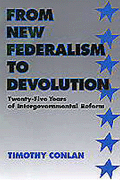In the period from 1970 to the early 1990s, Republican leaders launched three major reforms of the federal system. Although all three initiatives advanced decentralization as a goal, they were remarkably different in their policy objectives, philosophical assumptions, patterns of politics, and policy outcomes. Expanding and updating his acclaimed book, New Federalism: Intergovernmental Reform from Nixon to Reagan (1988), Timothy Conlan provides a comprehensive look at intergovernmental reform from Nixon to the 104th Congress. The stated objectives of Republican reformers evolved from rationalizing and decentralizing an activist government, to rolling back the welfare state, to replacing it altogether. Conlan first explains why conservatives have placed so much emphasis on federal reform in their domestic agendas. He then examines Nixon’s New Federalism, including management reforms and revenue sharing; analyzes the policies and politics of the “Reagan revolution”; and reviews the legislative limitations and achievements of the 104th Congress. Finally, he traces the remarkable evolution of federalism reform politics and ideology during the past 30 years and provides alternative scenarios for the future of American federalism.
Author
Timothy J. Conlan is university professor of public and international affairs at George Mason University and a fellow of the National Academy of Public Administration. He is the author of From New Federalism to Devolution: Twenty-Five Years of Intergovernmental Reform (Brookings, 1998). His 1988 Brookings book New Federalism was selected by the American Political Science Association as its Best Book on federalism and intergovernmental relations.

